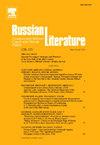塔蒂亚娜·托尔斯泰作品中的“普希金维利亚”
IF 0.3
3区 文学
0 LITERATURE, SLAVIC
引用次数: 0
摘要
对普希金的崇拜始于19世纪晚期,并被苏维埃政权采纳,在俄罗斯一直被崇拜到今天:被国家、被人民、尤其是被知识分子所崇拜。本文探讨了在塔季扬娜·托尔斯塔亚的短篇小说、散文和小说《天猫》(2000)中所反映的普希金崇拜现象。作者的目的是证明,尽管托斯塔亚对这一现象的态度一直是讽刺的,但她仍然对普希金本人保留了一些真正的准宗教信仰。本文章由计算机程序翻译,如有差异,请以英文原文为准。
“Пушкиноверие” в творчестве Татьяны Толстой
The cult of Pushkin, begun in the late nineteenth century and adopted by the Soviet regime, continues to be worshipped in Russia to the present day: by the state, by the people, and especially by the intelligentsia. This article explores the phenomenon of Pushkin’s cult as reflected in Tatyana Tolstaya’s short stories, essays, and novel The Slynx [Kys’] (2000). The authors aim to prove that, although Tostaya’s attitude towards this phenomenon has been consistently ironic, she nevertheless retains some genuine quasi-religious beliefs in Pushkin herself.
求助全文
通过发布文献求助,成功后即可免费获取论文全文。
去求助
来源期刊

RUSSIAN LITERATURE
LITERATURE, SLAVIC-
CiteScore
0.60
自引率
0.00%
发文量
50
期刊介绍:
Russian Literature combines issues devoted to special topics of Russian literature with contributions on related subjects in Croatian, Serbian, Czech, Slovak and Polish literatures. Moreover, several issues each year contain articles on heterogeneous subjects concerning Russian Literature. All methods and viewpoints are welcomed, provided they contribute something new, original or challenging to our understanding of Russian and other Slavic literatures. Russian Literature regularly publishes special issues devoted to: • the historical avant-garde in Russian literature and in the other Slavic literatures • the development of descriptive and theoretical poetics in Russian studies and in studies of other Slavic fields.
 求助内容:
求助内容: 应助结果提醒方式:
应助结果提醒方式:


